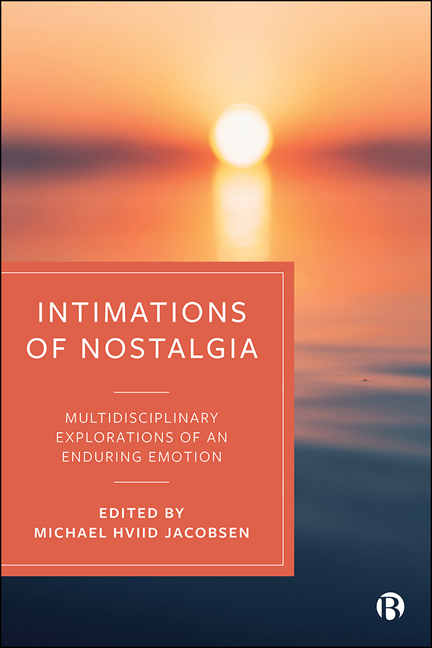Book contents
- Frontmatter
- Contents
- Notes on Contributors
- Preface and Acknowledgements
- Introduction: The Many Different Faces of Nostalgia – Exploring a Multifaceted and Multidisciplinary Emotion
- 1 Philosophy and Nostalgia: ‘Rooting’ within the Nostalgic Condition
- 2 History and Nostalgia: Historicizing a Multifaceted Emotion
- 3 Political Theory and Nostalgia: The Power of the Past in the History of Political Thought
- 4 Sociology and Nostalgia: Micro-, Meso-and Macro-level Dimensions of an Ambiguous Emotion
- 5 Psychology and Nostalgia: Towards a Functional Approach
- 6 Anthropology and Nostalgia: Between Hegemonic and Emancipatory Projections of the Past
- 7 Media Studies and Nostalgia: Media Philosophy and Nostalgizing in Times of Crisis
- 8 Marketing and Nostalgia: Unpacking the Past and Future of Marketing and Consumer Research on Nostalgia
- 9 Literature and Nostalgia: Vestiges of Paradise
- 10 Architecture and Nostalgia: The End of History, the End of the Future and the Prospect of Nostalgia
- Postscript: On Nostalgia of the Future and the Future of Nostalgia – Some Scattered Concluding Observations
- Index
2 - History and Nostalgia: Historicizing a Multifaceted Emotion
Published online by Cambridge University Press: 13 May 2022
- Frontmatter
- Contents
- Notes on Contributors
- Preface and Acknowledgements
- Introduction: The Many Different Faces of Nostalgia – Exploring a Multifaceted and Multidisciplinary Emotion
- 1 Philosophy and Nostalgia: ‘Rooting’ within the Nostalgic Condition
- 2 History and Nostalgia: Historicizing a Multifaceted Emotion
- 3 Political Theory and Nostalgia: The Power of the Past in the History of Political Thought
- 4 Sociology and Nostalgia: Micro-, Meso-and Macro-level Dimensions of an Ambiguous Emotion
- 5 Psychology and Nostalgia: Towards a Functional Approach
- 6 Anthropology and Nostalgia: Between Hegemonic and Emancipatory Projections of the Past
- 7 Media Studies and Nostalgia: Media Philosophy and Nostalgizing in Times of Crisis
- 8 Marketing and Nostalgia: Unpacking the Past and Future of Marketing and Consumer Research on Nostalgia
- 9 Literature and Nostalgia: Vestiges of Paradise
- 10 Architecture and Nostalgia: The End of History, the End of the Future and the Prospect of Nostalgia
- Postscript: On Nostalgia of the Future and the Future of Nostalgia – Some Scattered Concluding Observations
- Index
Summary
Introduction
Historians’ relationship with nostalgia is somewhat paradoxical. Given that nostalgia is one of the most prominent ‘historical emotions’ – perhaps the most prominent – and despite the memory boom since the 1980s, and the more recent interest in the history of emotions, historians have paid little attention to it, compared with researchers in other disciplines (Boym 2001: xvi). Richard Sennett remarked in 1977 that a ‘history of nostalgia has yet to be written’, and this is still by and large the case today (Sennett 1977: 168).
At the same time, historians frequently use the term nostalgia, though mostly in a negative, pejorative sense, thereby contributing to how nostalgia is viewed within their own discipline, in other disciplines and by the wider public. This makes the lack of historical research even more acute. Only when we know what we mean by the term ‘nostalgia’, how its meanings have changed and developed over time and what connotations and subtexts the term carries can we hope to employ it in an analytical and meaningful way. This chapter starts off by examining historians’ reservations around nostalgia, which are likely to be at least partly responsible for their reluctance to research it. The second part looks at how nostalgia has been theorized and historicized; and the final part discusses possible avenues and approaches for future research.
Why do historians reject nostalgia?
Nostalgia clearly does not have a good reputation among historians. ‘The problem with nostalgia’, John Tosh writes in a textbook for students, ‘is that it is a very lopsided view of history. If the past is redesigned as a comfortable refuge, all its negative features must be removed. The past becomes better and simpler than the present’ (Tosh 2015: 16). This is the most basic and common critique of nostalgia, and it can be summarized, as the title of an essay by David Lowenthal (1989) declares, thus: ‘Nostalgia tells it like it wasn’t’. In the eyes of such critics, nostalgia is more than a harmless ‘sentimental longing for or regretful memory of a period of the past’, as the Oxford English Dictionary defines it (Oxford English Dictionary Online). Rather, through the act of rendering the past an object of sentimental recall, nostalgia romanticizes and thereby distorts it.
- Type
- Chapter
- Information
- Intimations of NostalgiaMultidisciplinary Explorations of an Enduring Emotion, pp. 52 - 69Publisher: Bristol University PressPrint publication year: 2021



